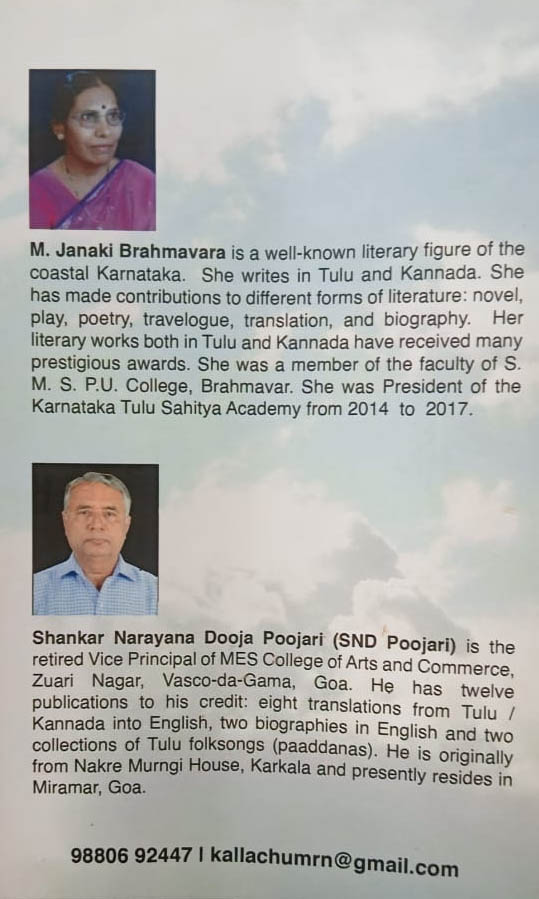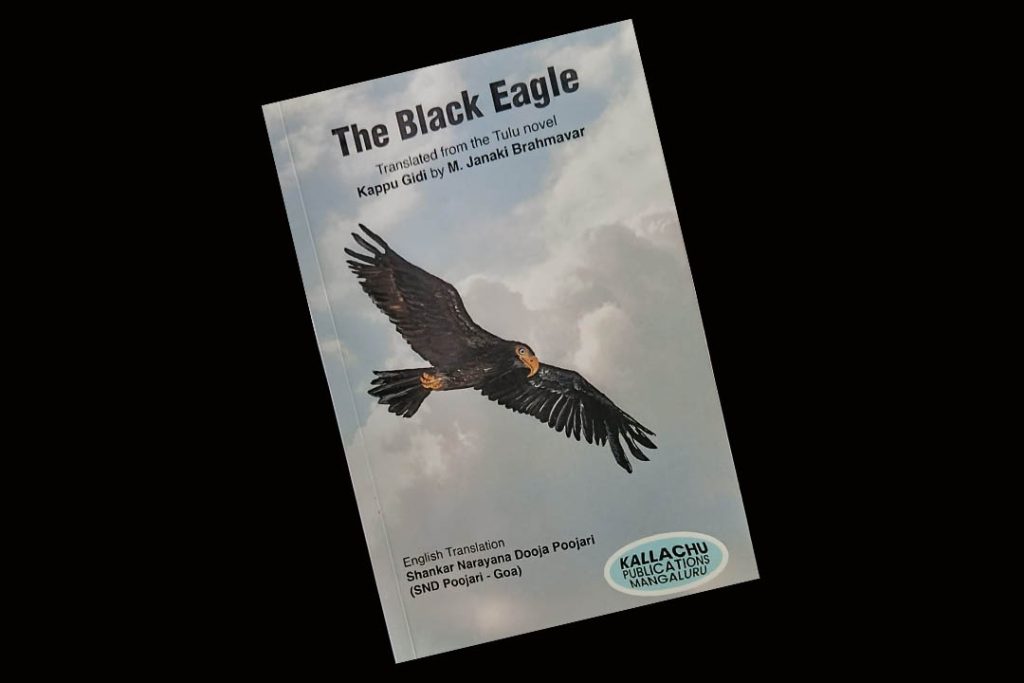‘The Black Eagle’ is a novel translated into English by Shankara Narayana Dooja Poojary from its original Thulu (Kappu Gidi) version by the veteran Thulu writer Janaki Brahmavar. It not only tells the story of a family in Thulunad but also meticulously depicts its culture and lifestyles of Thulunad around five decades ago.
The story opens with the monologue of the son of the family Shashank. He is the foster son of Damodar (Damajja) and Kalyani. They have adopted him from their tenant Akkani, whose grandson is Shashank. Damajja and Kalyani are big landlords of the village. They are childless. They bring up the adopted son by showering a lot of affection on him. But when he grows up as a young man, he leaves them and goes to Bombay for better prospects. There he falls in love with a beautiful girl called Shakila. Later he marries though his parents advise him not to. However, he finds that his wife is after money and carnal pleasures. It was an utter mismatch. Shakila, dissatisfied with her husband’s meagre earning, joins a job in a bar, much against Shashank’s request to remain at home looking after their daughter. Eventually they live separately. Shashank leaves Bombay and goes back to his village.
They have a daughter called Nita. She does not look after her daughter with love and care. Feeling lonely, Nita falls in love with Nishant and marries him though he is not having a good job. Neither does he show enthusiasm to do any work.
In the meantime, so many changes have taken place in the village. Because of the Government passing the Land Reform Act Damajja has lost all his land properties. He had given all his fields to different tenants on lease. He had never worked in the fields. Thinking that tenancy is more than enough to lead his life, his mother had stopped him from going to school also on a silly pretext. Now he became almost a pauper, without any amount of land to his credit. He repents for trusting his tenants. He repents for entirely depending on his tenants. A tenant called Chandappa cheats him by claiming the land which had been given to him on lease. Thus, the beleaguered old man stands helpless. Eventually, on his wife’s suggestion, Damajja goes to work in a small amount of land, which he finds in the record, was not leased to anyone. Somehow working very hard, he manages to lead a peaceful life. However, as I’ll luck would have it, his wife dies, and he became paralytic.
It is at this time that his foster son returns to him. But he is also so dejected in life that he does not show interest in cultivation. He has developed a taste for bird watching and taking photographs of birds and sending them to magazines. He loves his father, looks after him with care and concern, but he does not work in the fields. As his father was worrying about this, his granddaughter comes with her husband and joins them expressing her wish to stay in the village working in the soil.
Shashank’s hobby of bird watching has been described very elaborately in the narrative. While watching the birds, Shashank sees a pair of black eagles looking after their chicks. He clicks many photographs of the parent birds feeding their chicks. He wants to send them to some competition and hopes that it would bring him money and name. But after some time, the parents desert their chicks and fly away never to come back. Shashank feels sorry for the chicks. May be in the depth of his heart it reminded him of himself and his wife deserting their daughter, as a result of which she became an orphan having no one to guide her in choosing the right person as her life partner.
The novelist uses flashback technique throughout, to tell the reader what had happened in the past. The depiction of rural life has come out neatly throughout the novel. The author does not blame the Land Reform Act for the desperate condition of Damajja. Instead, she says that it is wrong on his part not to learn or practice any physical work. However, she points out the misdeeds of villainous characters like Chandappa in taking advantage of the Act for their selfish ends. On the whole the story has been narrated in a dexterous manner giving a smooth reading experience to the reader. The translator has shown his wonderful skill in bringing out the spirit of the original work successfully in English.
Parvathi G. Aithal

Title of the Book : The Black Eagle
Translator : Shankar Narayan Dooja Poojary
Thulu Original : Janaki Brahmavar
Publisher : Kallachchu Publications, Mangaluru
Year : 2024

